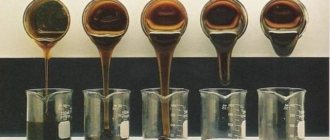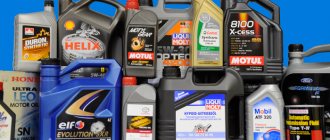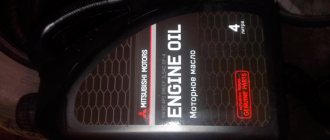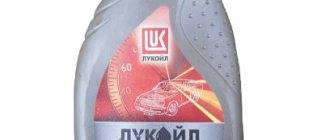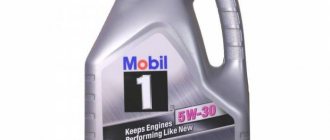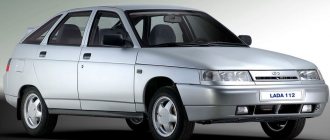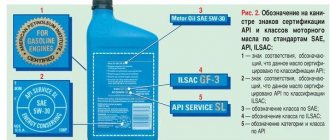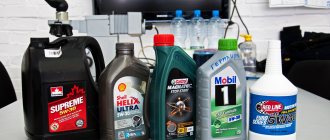Comparison of technical characteristics of Rosneft and Lukoil motor oils
A car owner who not only mercilessly exploits his vehicle, but strives to maintain it in proper technical condition, does not save money when purchasing consumables. However, even such a caring owner has to face difficult choices. In particular, when visiting a car dealership, the question arises which oil is better to choose: Lukoil or Rosneft. Finding the answer to such a question is quite difficult for a beginner, so we are ready to make the task easier, provide ready-made information, after reading which you will be able to figure out which oil product is best to buy to put into the engine of your own car.
What to do if problems arise?
Despite the presence of fuel quality control, it is sometimes extremely difficult to avoid problems and troubles. And the ones who suffer in such cases are car owners who, when filling their car with Shell gasoline, do not suspect that they may encounter difficulties.
If it was not possible to avoid trouble and the car turns out to be broken, you should take the car to a car service center. Here it is important to clarify the cause of the damage. If unplanned repairs are caused by low fuel quality, it is worth taking a gasoline sample for examination and additionally conducting an independent examination of the existing damage.
If you have any questions, please let us know Ask a Question
Important: gas station representatives are required to attend the inspection, so you should notify them of the planned procedure in a timely manner.
After the examination, it is worth demanding compensation from the oil company, and then, if it is not possible to reach an agreement out of court, it is worth filing a claim in court.
Features of domestic oils
Those who believe that only foreign auto chemical products meet international requirements are seriously mistaken, since domestic oil may turn out to be even better in some technical and operational parameters. In addition, the domestic product not only has good parameters, but its price is also more attractive than that of an expensive foreign analogue. Also, domestic oil is successfully combined with fuel, which is sold at gas stations. Naturally, the composition and quality of domestic fuel differ significantly from that offered outside the home country.
As practice shows, low-quality domestic fuel can conflict with a good foreign engine oil product. Some car owners deliberately purchase low-quality fuel, not wanting to incur additional costs. Auto stores offer a wide range of domestic oil products aimed at car engines. Let's analyze the products of two popular manufacturers:
- Rosneft (also has another popular name - TNK);
- Lukoil.
Both of these manufacturers are very popular among domestic motorists.
Domestic oils Rosneft
This company from Russia has been producing oils for automobile engines since 2007. Today its range includes more than a hundred products for both private vehicles and commercial vehicles. The company owns the brand of the same name along with the TNK trademark.
Engine oils from Rosneft are made from their own base oil with the addition of imported additives. The quality of the liquid is not inferior to foreign analogues, but is inexpensive. The company's product range is represented by four lines of motor oils:
- Premium is a synthetic oil suitable for modern car models that reliably protects internal parts.
- Maximum is a semi-synthetic fluid for engines manufactured in the early 2000s.
- Optimum is a good mineral water for domestic cars or foreign cars produced in the 80s and 90s.
- Exspress is an engine flushing oil that washes away deposits. Recommended for use when switching from one oil to another.
The oil company Lukoil, which appeared in the early 90s, has achieved good results over the years. In terms of revenue from sales of motor oils, this company is second only to Gazprom. It also ranks second in oil production after Rosneft.
One of the most popular domestic oils is Lukoil Lux 5W40. It is tested using special methods, so we can safely say that it is of high quality. The liquid has good dynamic viscosity at temperatures from -30 degrees.
The oil has a good value of 173 units. For the best imported lubricants, this figure does not exceed 185 units. Thus, Lukoil Lux 5W40 functions normally over a wide temperature range and retains its performance properties. At the same time, for sport use of a car, a different oil is required.
The alkaline number of Lukoil Lux 5W40 is 10.38 mg KOH per 1 g, so the liquid has good washing and neutralizing properties. As for the acid number, it is not the smallest and is 2.24 mg KOH per 1 g. This indicator indicates the content of anti-wear additives.
The pour point of the liquid is -46 degrees Celsius, and at -30 it retains all its original properties, without making it difficult to start the engine even in the northern regions of the country.
Comparison by main characteristics
Realizing that both Lukoil and Rosneft are successful manufacturers offering quality products, you still have to make a comparison to understand which oil to buy. Let's consider how motor oil copes with loads under different operating modes of the vehicle.
Starting in the cold
If nature decides to present an unexpected surprise, accompanied by a sharp drop in temperature, car owners get a chance to check the quality of their motor oil. In severe frosts, starting the engine of your favorite car turns out to be quite difficult. You've probably seen how avid motorists have to abandon their cars and take public transport to get to work. This is exactly the case when low temperatures did not allow the engine to start.
Rosneft oil fluid demonstrates good starting characteristics. At the same time, experts draw attention to the fact that even with a strong decrease in temperature, the viscosity of Rosneft oil remains quite high. However, it should be noted that Rosneft MM contains a large amount of sulfur, which causes serious contamination of the engine. But Lukoil provides engine oil fluid with low sulfur content, and this product has a better viscosity index.
Power and consumption
It is also useful to pay attention to the characteristics that affect engine power performance. In this matter, Lukoil also takes a leading position, ahead of Rosneft. We also draw your attention to the fact that Rosneft oil provokes greater fuel consumption during engine operation. For this reason, there are more and more people wanting to purchase Lukoil’s product.
Chemical composition
If you compare motor oils by chemical composition, it is useful to pay attention to the ash content. It is significantly lower for Rosneft, but the cleaning characteristics are much better for Lukoil. Lukoil also benefits from containing more zinc.
But Rosneft’s oil product is ahead of Lukoil in terms of indicators:
- critical load;
- welding loads;
- badass index.
By temperature
Engine oil will meet its specifications if the vehicle is operated under specified conditions. Motor fluid from Lukoil is capable of allowing the engine to function successfully at a maximum temperature drop of minus twenty-five degrees. But Rosneft oil can withstand even thirty-degree frost. If we compare the focus on maximum temperature, then Lukoil wins, the product is able to withstand 40-degree heat, while Rosneft maintains its characteristics up to the maximum maximum - 35 degrees.
Price
If you pay attention to the price indicator, then the Rosneft product is suitable for those car owners who want to save on everything. Rosneft motor oils are cheaper than Lukoil products, however, it should be noted that the difference is not very significant.
Popularity comparison
Comparing Lukoil and Rosneft motor oils in terms of popularity, it is easy to understand that Lukoil’s product is sold out faster, since most car owners prefer to purchase this particular motor fluid, which is ideal for any domestic car. Although we will not deny that some motorists actively purchase only Rosneft oils and remain absolutely satisfied with their performance characteristics.
So, we hope that, having familiarized yourself with the main distinguishing features of these two manufacturers, you will be able to choose for yourself the best option for engine oil that will ensure the successful functioning of your car.
Motor oils Gazpromneft
The company produces a large number of different Russian-made motor oils. Among them we can highlight Gazpromneft Premium - this line covers liquids of different viscosities, starting from 5W30 and ending with 20W50. Premium synthetic fluid is intended for engines of passenger cars and SUVs. The series is represented by four products that differ in tolerances and specifications.
Russian Gazpromneft Standard oils are mineral liquids intended mainly for carburetor internal combustion engines. These fluids comply with the API SF/CC specification and are offered in three viscosities:
- 10W-40;
- 15W-40;
- 20W-50.
The next domestic oil is Gazpromneft Super, available in the following viscosity options: 10W-40, 5W-40, 10W-30, 15W-40. This is a series of semi-synthetic oils with API SG/CD approval.
The Gazpromneft company makes its lubricating compounds from high-quality base oil with the addition of European additives. The quality of the liquid is not inferior to imported products. Among the key advantages of these liquids are:
- Synthetic oils of this brand have an increased service life due to antioxidant additives in the composition. Also, the liquids are compatible with catalysts without affecting their condition.
- Detergent additives in oils keep the engine clean, keep the soot fractions in suspension, preventing them from settling on surfaces or forming clots.
- The viscosity and operating temperature characteristics correspond to the declared ones. Accordingly, oils provide optimal operating conditions for the engine, simplifying starting at temperatures from -15 to +45 degrees.
- Protection of the motor in extreme operating conditions with constant starts/stops, long-term operation at idle and extreme heat.
- Minimum oil consumption for waste.
- Reduced fuel consumption by minimizing friction between engine elements.
Gazpromneft SAE 20W-50 oils help increase pressure in the lubrication system and solve the problem of insufficient lubricant supply, which is inherent in old used engines.
Which motor oils are more popular - Lukoil or Rosneft?
In February 2021, on PartReview, Lukoil motor oils were generally more popular than Rosneft.
In terms of the vote ratio, Lukoil motor oils surpassed Rosneft:
- For Lukoil, the ratio of positive votes (650) to negative (205) was 445 votes.
- For Rosneft, the ratio of positive votes (198) to negative (52) was 146 votes.
In terms of the number of reviews, Lukoil motor oils surpassed Rosneft:
- There are 276 reviews written for Lukoil motor oils: 203 positive, 19 neutral, 54 negative.
- 80 reviews have been written for Rosneft motor oils: 61 positive, 7 neutral, 12 negative.
About the manufacturer
Logo
Rosneft is the largest oil producer; this status was assigned to the company in 2013. The company produces various lubricants, including motor oils. It is a supplier to the aviation industry. Lubricants are able to withstand enormous temperature changes and the most extreme operating conditions. The creation of products is supervised by two scientific and technical institutes, which is why you can trust Rosneft motor oils as much as possible. Lubricants have more than 200 approvals from manufacturers, including KAMAZ, AVTOVAZ, Mercedes-Benz, Renualt, Volvo and others.
An example of a comparison of the main characteristics of products from two manufacturers - Lukoil and Rosneft
Although both brands of oil have different viscosity classes at low temperature operating conditions, they are still quite similar in their performance characteristics and are used in the same types of cars and engines.
By temperature
- Lukoil-Lux 10W-40 oil has an optimal low-temperature operating mode and is intended for temperatures of 25 degrees below zero.
- In turn, the product from the manufacturer Rosneft can operate down to temperatures of minus 30 degrees Celsius - but this is not the only difference in the temperature regime of use.
The upper temperature indicators of both brands of oil are the same - class 40 according to the SAE classification. But for Rosneft there are restrictions - optimal operation at temperatures up to 35 degrees, according to this classification. But for the Lukoil product this figure is higher - 40 degrees above zero.
Upon launch in cold weather
Due to its temperature operating conditions, Rosneft oil shows good starting characteristics when the temperature drops, but, as experts note, there is one surprising fact, since the viscosity of Rosneft oil remains the highest at elevated temperatures. Therefore, the energy-saving capabilities of such oil remain quite low, which, in turn, increases the protection properties.
Russian manufacturers of motor oils
Today there are several companies on the Russian market that have occupied the bulk of the lubricants sector.
These include:
- Rosneft;
- Gazpromneft;
- Lukoil - LLK-International;
- Delfin Group";
- "Bashneft".
"Rosneft"
One of the largest enterprises in the oil refining industry.
One of the areas of activity is the production of a wide range of lubricants for trucks and passenger vehicles, construction, agricultural and mining equipment.
The company's distinctive feature is a wide range of products that meet international standards.
Rosneft produces products under many well-known brands: Magnum Ultratek, Rosneft Premium and others.
In addition to engine oils, the company produces transmission oils, as well as high-quality additives for them.
Today, a major investment program is being implemented, which involves modernizing the production of key elements for liquids and automobile oils.
Already in 2021, it plans to expand its product range.
Manufacturers assure the availability of a new line of premium oil for cars and trucks.
Gazpromneft
Another large company, one of the market leaders in the production of lubricants and technical fluids.
Today the enterprise produces more than half a million tons of products annually.
The oil produced by the company is suitable for all types of vehicles of the domestic and foreign automobile industry.
The range of motor oils includes a full range of products, ranging from lubricants for sports cars to special equipment used in extreme conditions.
At the same time, Gazpromneft specialists assure that all products undergo full product testing taking into account the standards, rules and requirements of manufacturers.
New products include products for cars made in the USA, Korea, and Japan.
Gazpromneft motor oils can also be used in engines that require lubricants of the API SN/ILSAC GF5 series.
Starting in 2014, the production of completely new synthetic-based motor oils was launched - the G-Energy Far East 0W-20 series, as well as 5W-20.
The new product is ideal for new gasoline engines in passenger cars, small trucks, crossovers, SUVs and minivans.
Advantages of Gazpromneft oils:
- guarantee of additional engine efficiency. This is due to the competent combination of a special package of additives, a high-quality base and friction modifiers unique in composition;
- protection of the motor from the formation of carbon deposits, which guarantees its cleanliness throughout its entire service life;
- compliance of Gazpromneft oils with the high requirements of ILSAC GF-5 (regarding piston cleanliness);
- guarantee of protection of the internal elements of the turbine from blocking of oil channels and deposits.
According to many experts, Gazpromneft motor oils can be considered one of the best not only in the Russian Federation, but also in Europe.
The total production capacity is about 200 thousand tons per year. The production involves modern equipment with high precision.
Lukoil - LLK-International
The company’s specialty is the production of a wide range of motor oils for all categories of cars (passenger cars, special equipment, trucks).
There are more than 50 different items in the Lukoil series of motor oils alone.
The company produces motor oils for gasoline engines in accordance with the classification - for the USA (API - in a wide series from SF to SN), for Europe (ACEA - oils A1/B1, A3/B3/B4, etc.) and for Asia (ILSAC GF-4 as well as GF-5).
The range of lubricating compounds for diesel engines is also expanding.
Here, Lukoil products are also at their best, because the company’s oils are produced taking into account the most popular classifications of Asia (JASO DH), Europe (ACEA E5, E6, E7, C3, E4), as well as the international classification Global DHD-1.
Lukoil’s advantage is the production of oils for different types of engines and operating conditions.
In addition, the company produces lubricating compounds with varying degrees of viscosity according to the SAE classification - 15W-40, 20W-50, 5W-40, 10W-30 and so on.
The company regularly updates its product range. Thus, the new series of Genesis motor oils, which are used at the stage of car warranty service, are increasingly being promoted.
Enterprise "Delfin Group"
Well known for its wide range of motor oils for cars.
From the category of branded oils, it is worth highlighting Spectrol and Highway. LUXE oils are well known in the middle price sector.
The most affordable products are Pilots, Oilright and Yarneft.
All of the listed brands include the entire range of motor oils - synthetic, mineral and semi-synthetic.
At the same time, the company produces compressor, transmission and other types of oils.
Delfin Group specialists assure that their oils comply with current international standards and standards.
For example, products of the Lux brand are manufactured in accordance with international standards and meet the approvals of the largest manufacturers - Mercedes-Benz, Man, AvtoVAZ, KamAZ, and so on.
In addition to those mentioned above, it produces Repsol and Kansler oils.
At the same time, the market is regularly updated with new products, including Spectrol Galax 5W-30 motor oil.
The latter is suitable for modern diesel and gasoline engines equipped with direct injection and supercharging.
This oil is excellent for high speed driving and severe operating conditions.
Popularity comparison
In general, the characteristics of different oils from two manufacturers are quite different, even if you compare products from the same manufacturer.
But there is an indicator by which you can accurately determine which oil is better. The use of Lukoil oil, which is used in most domestic cars, should be considered more common.
This indicator best characterizes the attitude of car owners towards the products of both manufacturing companies. It is the number of regular users of Lukoil products that testifies to the advantages of this company. But every motorist has the right to choose his own oil, so for some, Rosneft may be the best manufacturer.
Flushing oil "Rosneft" Express
This product is also mineral-based and contains a large package of effective detergent additives. It is intended for quick flushing of gasoline and diesel engines from deposits that necessarily form during operation. It is recommended to use the Express product when changing the oil, as well as after using the lubricant for too long, for preventive cleaning of engines.
The process of using this "flush":
- Warm up the engine to operating temperature.
- Completely drain the used oil.
- Fill with Express oil. The volume should be standard. The entire oil system must be filled.
- Start the engine at idle speed and let it run for 15 minutes.
- Drain the used fluid. Pay attention to the color. If the oil darkens significantly during these 15 minutes, this indicates effective engine cleaning.
- Change the oil filter and refill with fresh oil.
Takeover rumors
Periodically, rumors appear in the press that Rosneft is absorbing LUKOIL. To some extent, they are generated by the expansionist policy of the state oil company. So, in 2013, Igor Sechin’s company completed the takeover of TNK, and then acquired Bashneft. Speculation began to arise that the next steps would be in the direction of LUKOIL.
Refutation
Since the topic of the threat of takeover regularly comes up, the head of LUK, Vagit Alekperov, is forced to refute untrue rumors. He states that there is no absorption mechanism. Blocks of shares can be purchased on the stock exchange, but at the moment the owners do not intend to sell their assets. The company is not for sale, while TNK was sold by shareholders, and Bashneft was put up for sale.
In addition, no official proposals were received and no negotiations were held.
Alekperov says the company plans to remain private in the future. There is no threat of takeover. And there is no talk of LUKOIL buying Rosneft.
Specifications
| Index | Test method (ASTM) | Value/Unit | |
| 1 | Viscosity characteristics | ||
| — | Kinematic viscosity at 100 °C | GOST 33 | 14.12 mm²/s |
| — | Dynamic viscosity of CCS at - 30 °C | ASTM D5293 | 5800 mPa*s |
| — | Viscosity index | GOST 25371 | 176 |
| — | Base number | GOST 30050 | 8.30 mg KOH/g |
| — | Sulfate ash content | GOST 12417 | 1.1% wt. |
| — | Volatility according to PLA,% | ASTM D5800 (Method A) / DIN 51581-1 | 11.6 % |
| — | Density at 20 °C | GOST R 51069 / ASTM D4052 / ASTM D1298 | 852 kg/m³ |
| 2 | Temperature characteristics | ||
| — | Flash point in open crucible | GOST 4333 | 220°С |
| — | Pour point, °C | GOST 20287 | -33°С |
Gasoline comparison
Which is better LUKOIL or Rosneft in retail sales? This is what we will try to find out in a comparative analysis of gasoline and motor oil.
If we analyze the composition using the example of 95 gasoline according to the parameters of octane number, content of sulfur and aromatic compounds, and fractional composition, it turns out that all indicators are within normal limits. The quality of gasoline is approximately the same:
Quality indicators
| Standard according to GOST | LUKOIL | TNK | |
| Octane number | 95,0 | 95,9 | 95,0 |
| Mass fraction of sulfur, mg/kg | No more than 10 | 5,7 | 7,3 |
| Volume fraction of aromatic hydrocarbons, % | No more than 35.0 | 34,5 | 28,1 |
| Price per liter for 2018 | — | 44,9 | 45,8 |
You can decide which gas station is better based on pricing policy, bonus programs and geographical location.
Choose engine oil: ours or imported?
What kind of oil does your favorite iron horse eat, and will his “cholesterol plaques” grow from imported products, or maybe, on the contrary, they will dissolve? In this matter, I always consult with the examination department of the magazine “Behind the wheel” - the only authority where they spend money on serious scientific research, not trusting “shamans”.
In the latest examination of 5W-40 motor oils, ZR magazine tested eight non-Nashen synthetics, checking the real “mileage” of these super oils without topping up. Just a question: where are our oils? Are they that much worse? No, it is wrong to say that.
For modern cars, service books determine the maintenance interval with an engine oil change of about 15 - 20 thousand km. And often they increase the declared resource by another tens of thousands of kilometers.
There is, for example, the same Lukoil - API SN/CF 5W-40 synthetics. There is nothing cooler than SN, and there are also approvals from BMW, MB, Porsche, Volkswagen, Renault... They say that Lukoil even sells its base oil to a bunch of countries, but this is just talk, you can’t add it to the protocol. By the way, the same Korean “ZIK”, although it officially states that the most famous brands work with its base oil, they say, does not say which ones - this is a big, big secret. For such a small company...
In fact, ZR has already carried out a comparative examination comparing ours with “not ours”, testing semi-synthetics 10W-40. Then our oils practically did not lose to either the Germans or the Koreans, and in some ways they were even better. They also aimed at synthetics of different quality groups.
On the Russian side, the test then included Lukoil Lux, TNK Magnum and Rosneft Premium. They were accompanied by hydrocracking “SINTOIL Ultra” and “TOTEK Astra Robot” (according to the manufacturer’s website, it is also “full synthetics” based on polyalphaolefins). In terms of quality groups, all these oils were different - SM from LUKOIL and Rosneft were adjacent to SL from TNK and SJ in SINTOIL Ultra. Among the imports, the hydrosynthetic-based group was represented by the German oil Mannol Extreme (API SL/CF). Fully synthetic oils were introduced by the Japanese ENEOS Gran-Touring (API SM). And the most modern group of “ester” oils was presented by the Belgian XENUM X1 (API SM/CF).
What happened? Yes it turned out fine! In short, imported oils turned out to have better “ecology”, while ours had better protective properties. In terms of efficiency, the ester-based oil, Xenum X1, won. Compared to the reference mineral oil, it saved almost 9% of fuel - that’s a lot! But our LUKOIL Lux and TNK Magnum lagged behind the leader quite a bit, reducing fuel consumption by 8 and 7%, respectively. This is bad? No, that's good!
Mannol Extreme received the Oscar for power. With it, the engine produced 3% more “horses” than with the reference oil. Of ours, LUKOIL Lux again came close to it. But then the ecology began...
At that time, not a single oil met the required 0.2% sulfur. This is not a crime: during operation, all oils could well have received additional hundreds of percent from Russian fuel, which is no different in the low amount of sulfur. The Japanese oil ENEOS Gran-Touring came closest to the required level, followed by the Belgian Xenum X1. But here’s what immediately catches your eye: the total level of sulfur in Russian “synthetics” is almost twice as high as in imported ones! There is also less phosphorus in imported oils: they are more environmentally oriented.
But ours have higher tribological parameters! And this is explained by... their worst environmental friendliness! After all, sulfur and phosphorus are natural anti-seize additives, and the more of them, the better the friction unit is protected. And this is another manifestation of the ideology of the Western manufacturer - service life is secondary, ecology is primary! Rosneft Premium won in this nomination, and LUKOIL Lux took second place.
As for domestic supernova oils, ZR will test them a little later, when they organize a “wall to wall” competition - ours against non-ours. It’s difficult to say now whether ours will yield on sulfur or not: we’ll wait for tests. In the meantime, we’ll tell you how import without topping up worked in the last test.
The elite took part in the tests - the coolest and most popular brands of “full synthetics” with a viscosity class of 5W-40: Castrol, Shell, Mobil, Esso, BP! Plus the best French brands that we have not previously included in tests - ELF and TOTAL. From the best eastern brands we took ZIC. This set covers approximately three quarters of the market in this segment. According to the European quality classification, all selected oils belong to the highest quality group - A3/B3/B4. By quality class - most oils are SM/CF, Castrol Magnatec - SN/CF, the rest - SL/CF.
Six months later (!) the tests on bench motors summed up the results. Firstly, there was no need for intermediate oil top-ups - four liters of initial refueling was enough for all eight participants. But the oil consumption for all eight samples was different. ZIC and Castrol Magnatec oils have the least amount: their engines “ate” only 0.6...0.7 liters.
Other oils gave a similar result - from 1.2 to 1.5 liters, which, taking into account the rather rough measurement method (by drain), can be considered almost the same.
In terms of changes in the alkaline number and content of active elements, all oils performed well: none of them reached the rejection parameters. This means that all manufacturers use high-quality additive packages. However, this is not surprising - their manufacturers can be counted on one hand, and all of them are serious specialized companies.
But in terms of viscosity, the picture is significantly different. Thus, for the Korean ZIC XQ, the change in viscosity over 15 thousand kilometers was practically within the measurement error. But at the end of the run, ESSO Ultron went beyond the permissible SAE class limits for viscosity changes! This, of course, did not kill the engine, but it noticeably increased its gluttony. Of the other oils, BP Visco 5000 oil came closest to the forbidden border.
All oils, as befits “full synthetics” with high quality classes, demonstrated their energy-saving functions. We didn't find much difference. As for power, motors running on Total Quartz, ELF Excellium and BP Visco 5000 oils received at least a small but still noticeable bonus.
The minimum mass loss of crankshaft bearing shells and piston rings, taking into account the method error, was found in engines running on Shell Helix HX8, ZIC XQ and Castrol Magnatec oils. These parameters are indirectly confirmed by analysis of data on the content of wear products in oil samples taken at the end of the tests. And here the leaders are the same, and the “Korean” ZIC XQ found significantly less iron than other oils.
High-temperature oil deposits were investigated by examining the side surfaces of the pistons. ZIC XQ, Shell Helix HX8 and both “French” ones from ELF and Total look a little better than others.
The results of the “race” are in the tables. We won’t advertise to anyone, although the Koreans probably looked better than others.
By the way, this is an important question. How is the “longevity” of an oil really related to seasonality? In other words, does the choice of oil depend on the annual mileage? One travels 15 thousand in six months, the other in a year...
It's hard to answer. Moreover, what about cars that spend most of their lives stuck in traffic jams?
There is no mileage, but the oil works, and in the most unfavorable conditions for it. This is a task for a separate study that needs to be conducted. In the meantime, the advice is simple: for those who spend more time in traffic jams than driving, it is better not to pay attention to mileage at all, but simply change the oil every season. But at the same time, do not buy something that is obviously cheap! The cost of the tested “super synthetics” does not exceed the amounts we pay for a tank of gasoline!
And the “longevity” of the oil also means a bunch of additional advantages, such as improved engine protection, an increased level of detergent properties, and improved energy-saving properties. All this completely pays for the extra three to four hundred that we supposedly overpay for expensive oil. Assessing the actual service life of oil under “snail” driving conditions is a task for the near future.
I recommend articles:
- Engine oil: slippery questions
- Motor oils: more slippery questions
I thank the manager. Mikhail Kolodochkin, the examination department of the magazine “Behind the Wheel”, for assistance in preparing the material.
The design uses photographs taken in Giorgetto Giugiaro's studio.
Change in kinematic viscosity of motor oil samples taken at different stages of testing (2012)
| Oil brand | Temperature, °C | Kinematic viscosity, cSt, through | |||
| 500 km | 5000km mileage | 10000 km | 15000 km | ||
| BP Visco 5000 | 100 | 13,79 | 14,54 | 14,90 | 15,68 |
| 150 | 6,04 | 6,14 | 6,39 | 6,75 | |
| Castrol Magnatec | 100 | 13,34 | 13,72 | 14,16 | 14,43 |
| 150 | 5,67 | 5,79 | 6,01 | 6,06 | |
| ELF Excellium NF | 100 | 13,20 | 13,30 | 13,67 | 13,74 |
| 150 | 6,09 | 6,16 | 6,52 | 6,52 | |
| ESSO Ultron | 100 | 13,70 | 14,19 | 15,45 | 17,13 |
| 150 | 5,91 | 6,09 | 6,60 | 7,07 | |
| Mobil Super 3000 | 100 | 13,33 | 13,41 | 13,69 | 14,59 |
| 150 | 5,74 | 5,73 | 5,82 | 6,10 | |
| Shell Helix HX8 | 100 | 12,73 | 13,03 | 13,51 | 14,37 |
| 150 | 5,44 | 5,73 | 5,89 | 6,05 | |
| Total Quartz 9000 | 100 | 14,24 | 13,96 | 14,19 | 14,94 |
| 150 | 6,05 | 6,14 | 6,09 | 6,36 | |
| ZIC XQ | 100 | 13,42 | 13,41 | 13,61 | 13,49 |
| 150 | 5,79 | 5,73 | 5,79 | 5,76 |
automps.ru
Reviews
Evgeniy, 27 years old
I am the owner of a twenty-year-old seven Lada, I use Rosneft premium, the waste is minimal, the engine runs quietly and smoothly, I recommend it.
Alexander, 22 years old
After listening to a friend, I decided to purchase Rosneft Premium 5W-40 oil for my iron horse and did not regret it. I didn’t see any particular differences from expensive imported motor oils.
Anton, 30 years old
I have been pouring this oil into my swallow for two or three years now. I didn’t experience any problems starting in cold weather. If there is any waste, it is insignificant.
Oleg, 32 years old
I fill it in the Priora, I change it every 7-8 thousand kilometers. I think that if such a replacement interval is observed, the engine will last a long time. Therefore, I see no point in overpaying for a foreign brand.
Pavel, 50 years old
We rarely have severe frosts in our city, so I can’t say anything about the fluidity of this oil in the cold. However, it is worth noting that, despite the low cost of this oil, I noticed smoother and quieter operation of the car’s engine.
Ivan, 44 years old
In my opinion, this synthetic is a good motor oil for budget cars, as confirmed by reviews. True, after 2-3 thousand kilometers with an active driving style, I have to add oil because of its waste.
Citroen C4 black starship › Logbook › Fried Lukoil Lux 5w40 and Rosneft Premium 5w40 oils
upd: I recommend reading the article: “Where does this temperature come from in the engine?”
bmwservice.livejournal.com/38916.html
Reference: The oil frying test is an objective assessment of the thermal stability of the oil and this is officially confirmed by Shell, ExxonMobil and Motul (tyts).
Yesterday, at my father’s request, I fried the oils that he poured and pours into his cars.
Now he has a new Logan 2014 and he pours Rosneft Premium 5w40 oil into it.
He poured Lukoil Lux 5w40 into his old Logan 2005.
Compare with burning in a laboratory:
p.s. Here's another read, the man also fried
goodron1975.livejournal.com/
upd: despite the result of frying, Lukoil can be used as a rinse:
